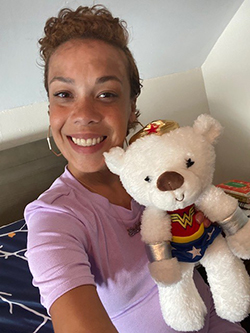
Popular Locations
- Yale New Haven Children's Hospital
- Yale New Haven Hospital - York Street Campus
- Yale New Haven Hospital - Saint Raphael Campus

Published November 23, 2020


In 2020, shortly before yet another heart surgery – Ardelis’ fourth since infancy – she received a teddy bear in a Wonder Woman costume. It serves as a reminder to Ardelis of her own strength in dealing with congenital heart disease, defined by her many trips to hospitals, surgeries, recoveries and perseverance.
Ardelis’ courage is apparent through her forward-looking future now that she is no longer in the grip of heart failure, which prompted her most recent surgery at age 37.
At just 4-months old, Ardelis was diagnosed with complex congenital heart disease, or birth defects that affect her heart. Annually, about 40,000 babies in the United States are born with congenital heart disease and about one quarter of them require surgery within the first year of life.
Ardelis was born with a smaller heart, a condition known as a “single ventricle” with small left heart structures, and this required lifesaving surgery. Her condition also included other complex features including that her heart’s pulmonary and aorta arteries were in reversed positions (dextro-malposition of the great arteries); and both great arteries came from the right ventricle (double outlet right ventricle).
As a child who resided outside of Connecticut, she had a series of corrective surgeries (Blalock-Taussing shunt, Glenn shunt, and Fontan procedures), the last at age 5, also lifesaving and aimed at having a balance between blood flow to her lungs and her body. But the Fontan style used in her operation years ago was an older one and prone to complications. Over her lifetime, she developed recurrent irregular heart rhythms and required medications and electrical cardioversions to correct the rhythm issues.
Now 38, Ardelis doesn’t remember much of her childhood “but I do know that I went to the hospital a lot.” In 2011, intent on continuing to take care of her heart and then living in Connecticut, Ardelis saw Robert Elder, MD, director of the Adult Congenital Heart Program at Yale New Haven Hospital Heart and Vascular Center. Dr. Elder, a Yale Medicine staff member, is board-certified in adult internal medicine, pediatrics, pediatric cardiology and adult congenital heart disease.
A few years ago while under his care, Ardelis started to feel unwell and remembers Dr. Elder telling her that she was starting to have symptoms of heart failure, which means the heart muscle is not able to pump enough blood and oxygen to support other organs in one’s body. Her symptoms included fluid retention, namely in her abdomen, shortness of breath, recurrent heart rhythm problems, and fatigue.
These symptoms made it difficult to work in an office, leading to a reduced schedule. “It felt like I was under water – every step was heavy and I couldn’t breathe.”
For personal reasons, Ardelis initially didn’t want another surgery but changed her mind a few years later. In July 2020 she had a complicated heart surgery at YNHH known as a Fontan revision. “This is a specialized, major open heart surgery designed to take the old style Fontan and convert it into a new, streamlined Fontan. Although it is a major undertaking, long-term patients benefit from improved quality of life, improved ability to do activities and exercise, and decreased problems with arrhythmias and clots,” explained Dr. Elder.
Because her surgery was performed during the COVID-19 pandemic, Ardelis could not have visitors, though her mother was able to walk her into surgery and be there when Ardelis woke up. “That was really, really good,” she said.
“I can’t say enough about Yale (New Haven Hospital) and Dr. Elder and team because they helped me. It was more than physical,” said Ardelis. “Everybody was just really great before the surgery, after the surgery.”
In a thank you letter she sent to “the team that saved my life,” Ardelis noted deciding on surgery “was one of the best decisions in my life. Because of you all I have a better quality of life and I can look to the future with hope. Now, instead of having a few months or a few years of life I have the prospect of living for many years.”
Ardelis has relied on courage, faith, family, friends and even comedy to deal with her condition. She may not be able to run long distances but quipped, “If I can’t do anything else I’ll at least try to dance in my house.”
She also has a message of hope for others who may be going through something similar: “Just to try and stay positive. Nowadays with the medical advances there’s so much they can do for us, there is so much hope and we could live a good, full life.”
Learn more about care of adults with congenital heart disease.
Sign up to receive valuable information about heart health.